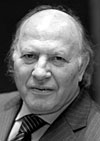
introducing readers to writers since 1995
October 20, 2004
He Came Dancing Across the Water, Kertész, Kertész
by Ron Hogan I went to the 92nd St. Y last night to see Nobel-winning novelist Imre Kertész (IM-ray CARE-tez) in a rare American appearance. After being introduced by Thane Rosenbaum as "a witness to a world that before then had never existed," in reference both to his own youthful imprisonment at Auschwitz and Buchenwald and his fictional testimony to the Holocaust survivor's experience in works like Fatelessness, Kaddish for an Unborn Child, and Liquidation, Kertész came out and began reading in his native Hungarian, at which point another Hungarian in the audience yelled something at him along the lines of "stand closer to the microphone." So if any of my readers are writers who've struggled with book tours, rest assured: it doesn't get any better when you're one of the greatest writers in the world. (You'll even have to face the same questions about your "writing process.")
I went to the 92nd St. Y last night to see Nobel-winning novelist Imre Kertész (IM-ray CARE-tez) in a rare American appearance. After being introduced by Thane Rosenbaum as "a witness to a world that before then had never existed," in reference both to his own youthful imprisonment at Auschwitz and Buchenwald and his fictional testimony to the Holocaust survivor's experience in works like Fatelessness, Kaddish for an Unborn Child, and Liquidation, Kertész came out and began reading in his native Hungarian, at which point another Hungarian in the audience yelled something at him along the lines of "stand closer to the microphone." So if any of my readers are writers who've struggled with book tours, rest assured: it doesn't get any better when you're one of the greatest writers in the world. (You'll even have to face the same questions about your "writing process.")
Kertész's Hungarian readings were punctuated by solo piano performances of Dvorak and Schubert by his friend, Andras Schiff. Then Rosenbaum returned to the stage to read (in English) several passages from the three novels previously noted, and between his curly mullet-like hair and a certain pitch that crept into his voice when he was trying to imitate old men or getting excited by a darkly humorous bit, and especially when his pace quickened in excitement, the overall effect was like hearing a young Gene Wilder.
Kertész returned to the stage with a translator to field questions from Rosenbaum, who appeared to have a very strong idea of what the laureate's fiction was about. The conversation hit an early bump when Rosenbaum wondered if perhaps the childhood trauma of the concentration camps had so heavily weighed upon Kertész that he repeatedly returned to it in fiction while not writing so much about his experiences living under communism, to which the author replied that he had written quite a bit about that subject but it was apparently not as well known in English as his other work. The followup--"don't you think it's interesting, then, that the world remembers you more as a Holocaust survivor?"--was a valiant effort at a save, and Kertész met it halfway allowing that "the Holocaust is a universal experience," while life under a communist regime was a particular experience, especially in its Hungarian variety. Asked if he thought much about other Holocaust survivors who wrote about their experiences and then committed suicide, he suggested that it was precisely because he endured communism after being liberated from the camps that he never killed himself. "They expected too much after the Holocaust from the worlds they now lived in," he explained. Kertész wrote in one novel, "There is no cure for Auschwitz," and in another, "I already know there will be happiness." Rosenbaum saw "tremendous contradictions" in the two statements, and pressed Kertész, "Which is true?" The short answer--different texts, different contexts--didn't seem to fully satisfy, and the conversation would veer back in this direction quite a few times, though Kertész refused to be pinned down, doing his best to renegotiate a literary context. Pressed about whether authors like Primo Levi were right in saying that the Holocaust could never be depicted in words, Kertész said that the key was to simply "describe the describable" in such a way that the reader is engaged by the protagonist's dilemma; secure that emotional involvement and you wouldn't even have to attempt to describe the indescribable aspects of life in the camps. "And a character in a novel," he would later add, "is nothing but a choice of language."
love the neil young reference...what a killer...
Posted by: Jimmy Beck at October 20, 2004 03:26 PMyour PayPal donation
can contribute towards its ongoing publication.